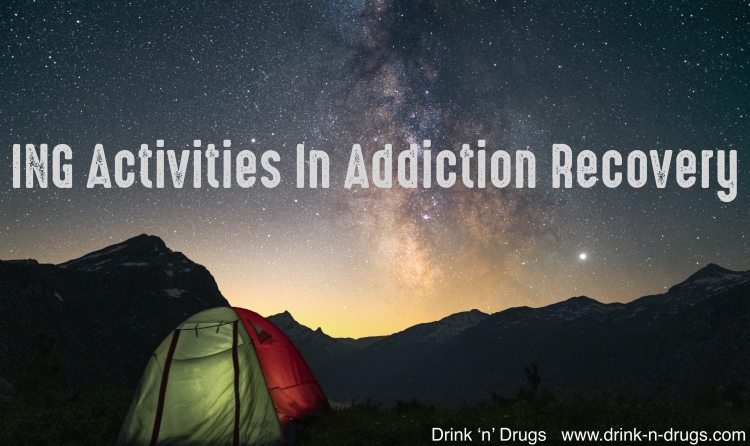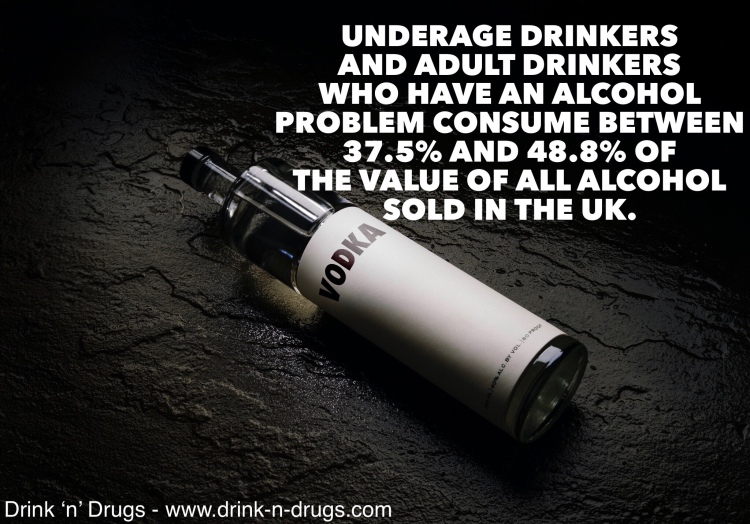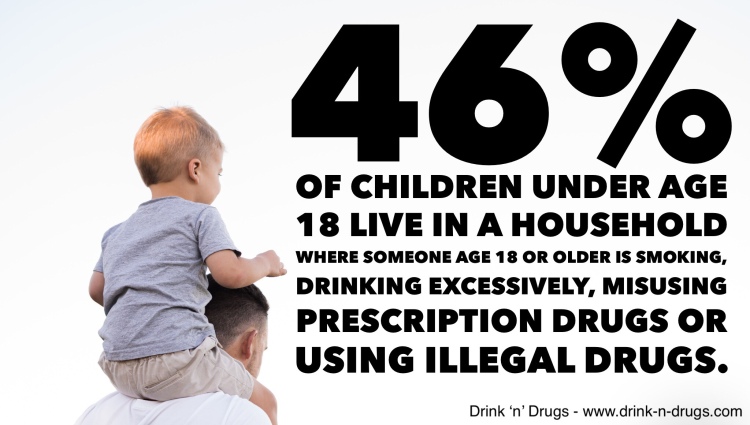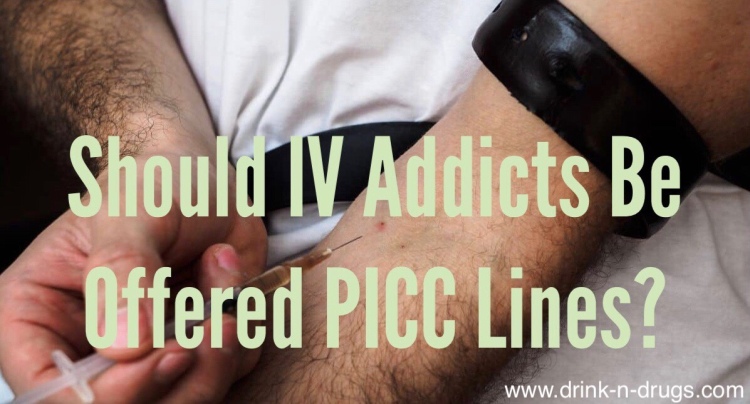Studies tell us that the children of alcohol addicts and drug users are eight times more likely to become addicts than the children of clean and sober parents.
So why do the sons and daughters of addicts experience a significantly higher likelihood of developing their own addiction later on in life? One could argue that close proximity to substance use throughout the child’s childhood gives them the idea that experimenting with using or drinking, relying upon substances to manage stress or negative feelings or using/drinking to satisfy a physical and mental dependency is “okay” or “normal”.
But there has to be more to it than that. As adults, the sons and daughters of addicts do know that substance use is wrong and causes both physical and mental health problems.
So The Question Is, Why Do Parents Still Engage In Such Habits?
Life With An Addicted Mum or Dad
Children learn how to function, learn to develop their moral compass and how to behave as a result of observing their parents, grandparents, caretakers, mentors, guardians, leaders, older siblings, teachers and certain celebrity role models etc.
Of all the adults in a child’s life, parents by far have the most substantial impact on their child or children. And if that impact is multiple years of drinking or drug use and it’s associated characteristics and behaviours, parents are quite literally teaching their kids that drug and alcohol use is normal, healthy, acceptable and a “good”, quick way to cope with any negative feelings or situations that will arise in the individuals lifetime by altering it with chemical alterations, which we know to be completely untrue.
which only masks their negative feelings and thoughts and only makes those issues pile up, getting worse and worse the longer that they run away from those negative thoughts and feelings which are still there when the drugs and alcohol wears off. They also:
- Only masks their negative feelings and thoughts and doesn’t get rid of them
- Means that the individual will have to work twice as hard in the future when it comes to working through them when they enter recovery at a later date
- Causes an accumulative effect of negative thoughts and feelings the longer that drugs and alcohol are used to escape the way that they feel at that time
An article published in the Huffington Post explored this concept further. The article goes into great length on the sheer impact of growing up with a parent who struggles with addiction.
Children of addicts grow up to say that they don’t know normal is, that they are afraid for themselves, for their parents and for their own future children. They say that they are “controlling perfectionists,” but that they are also terrified, guilty or continuously doubting themselves.

The truth is, someone who grew up with an addict for a parent has been exposed to so much abnormal misbehaviour and poor parenting that they were robbed of what should have been a healthy and nurturing childhood where healthy habits, routines and structure is in place, allowing them to learn new, vital information, behaviours, positive coping strategies and skills that they will later come to rely upon when they are adults themselves.
But in that same token, all of this can be repaired and remedied if the parents just get help and apply it at the earliest possible opportunity. A family stricken by one or more types of addiction or addictive behaviours are also a family that is struggling with some other past or current crisis, trauma or form of PTSD that is causing the addiction to develop, continue and most often, worsen. In a previous article, we looked at the role abuse, PTSD and adverse childhood experiences play in addiction. You can read the article here.
Other issues which can compound the issues that the family of addicts and addicts themselves face can include finances, another family member, a problem within the family, a harsh, traumatic incident from the past, abuse, loss of job or education, unstable living standards, hoarding, OCD, lack of education or grieving the loss of a friend or loved one etc and the list goes on…
Children of addicts can heal and go on to live a healthy and happy life if they are given the professional help and support that they will need to “alter” their perception of the world, what’s right and wrong, what’s acceptable, what isn’t and learn new, positive, healthy coping techniques and strategies.
But they need to ensure their parents also get the help that they need to ensure that the conditions and circumstances which caused them to come to use drugs and alcohol in an attempt to cope with the pain, worry, distress or loss that they are feeling which led to them developing an addiction are corrected.
Seeking help also teaches their children better coping and gain the vital knowledge and skills that will allow the children from developing their own addictions when they are adults themselves.
The Statistics – A Much Bigger Problem Than We First Thought
The Centre For Social Justice (CSJ) for problem drug use is one that we find noted in various government reports. A 2003 Home Office study concluded that in the UK there were 250-350,000 children “dependent” on a parent using drugs. The authors of the research obtained information on around 313,000 drug and alcohol users receiving treatment in England and Wales between 1996 and 2000. Parenthood data was available for 221,000 of these drug and alcohol users; of them, 95,000 (43%) reported having children. Data for Scotland was collected separately and wasn’t available at the time of this article being posted.

On average, there were approximately two children for every drug-using mother and two for every drug-using father. Because an unknown number of children would have had both their mother and father in drug treatment, the Home Office estimated the minimum and maximum number affected to produce a total of between 200,000 and 300,000 children. Adding in estimates for Scotland raised the total to between 250,000 and 350,000.
The researchers then arrived at a very similar figure by analysing census data for 2000/01 on the number of people in England and Wales receiving drug treatment, effectively “double-checking” their estimate using a different method.
It’s important to note that there are a couple of problems with this data. The final figure only includes those people who were receiving treatment for their drug addiction – it’s not a reflection of the total number of parents who might have been in need of help for either alcohol alone or a polypharmacological dynamic where addicts often use two or more substances at the same time. The study’s researchers therefore conclude that there are likely to be more than 250-350,000 children growing up with a parent addicted to drugs.
What’s more, this figure of 250-350,000 children is now likely to be out-of-date. From data collected by the National Drug Treatment Monitoring System (NDTMS) since 2005, we can see that the number of individuals in drug treatment has increased since 2000 (the end-date of the original Home Office study). And whilst the NDTMS isn’t able to tell us how many of these people are parents, we can expect – to an extent – a substantial rise in their numbers each year going forward as more people come to rely on substances to deal with the ever increasingly stressful world we live in.
How Many Children Are Living With An Addicted Parent?

The Children’s Commissioner recently claimed that it’s “largely unknown” how many children in the UK are affected by a parent’s alcohol use. However, there have been many attempts to estimate the number.
A group of researchers, writing in the Journal of Public Health, calculated that there are 705,000 children living with parents addicted to alcohol. They used sample statistics from the Health Survey for England and General Household Survey to extrapolate numbers for the population at large.
Meanwhile, the National Association For Children Of Alcoholics (NACOA) puts the number higher – at 920,000 children. However, NACOA’s estimate is based on a questionnaire that it sent out to 9,789 adults.
It asked these individuals, selected to be representative of the population at large, to answer questions about their childhood, including “Did you grow up in a home in which either or both of your parents drank too much?”. Hopefully a bigger, more recent and more comprehensive set of data will be available for better, bigger studies in the near future if we are to all work together to overcome this ever increasing, life threatening issue which can after all, be prevented.
Statistical Data For The USA
According to the National Association for Children of Alcoholics (NACOA), “More than 28 million Americans are children of alcoholics; nearly 11 million are under the age of 18. This figure is magnified by the countless number of others who are affected by parents who are impaired by drugs and/or alcohol.”

Looking further into the issue, NACOA researchers found that three out of four child welfare professionals cite substance use as the single most prominent cause for the upsurge in child maltreatment since 1986.
In fact, the majority of child welfare professionals also state that substance use on the part of the parents, contributes to more than half of all child maltreatment cases.
NACOA researchers also commented on common-denominator factors that they noted in their studies of children raised by alcoholic parents. According to the research, families affected by alcoholism are prone to:
- Increased family conflict
- Emotional or physical violence within the family
- Decreased family bonding or mutual group family support
- Decreased family organisation
- Increased isolation within the family
- Increased stress levels among family members
- Increased work and school problems
- Marital/relationship strain
- Frequent family moves
- Increased risk of parents or family members being arrested or jailed
- Increased involvement in crime and criminal acts
Those who use drugs not only fall into the same issues mentioned above, but also end up with some of the other issues listed below.
- Stunted educational, psychological and physical growth and development
- Increased risk of death and at a younger age
- Higher risk of mixing substances which can cause fatal reactions
- Increased risk of overdose
- Increased long and short term physical health conditions

Here’s a critical point. According to that same organisation, it’s not just parental drug use that harms children; it is the attitude about drug and alcohol use that parents convey to their children that is also significant.
The influence of parental attitudes on a child’s drug-taking or drinking behaviours may be as important as actual drug use by the parents or guardians.
NACOA
An adolescent who perceives that a parent is permissive about the use of drugs or overindulge in alcohol consumption are more likely to use drugs or abuse alcohol.” The key to solving this, again lies in making sure parents get help and support via the relevant treatment and support services when it’s needed, not only for them, but also the immediate family and friends who live
or lived with the addict who may have also suffered as a result of the parents drug and alcohol use. With proper treatment and support, parents can find a pathway to abstinence and sobriety for the long-term.
“An adolescent who perceives that a parent is permissive about the use of drugs is more likely to use drugs.”
NACOA
It would also be helpful for their kids to receive the correct data, facts, relevant media such as helpful videos, websites, groups, programs and written help about drugs and alcohol at the earliest possible opportunity where they are capable of properly understanding and applying such information.
A childhood spent growing up in a home with parents or guardians who use drugs or alcohol are going to convey the notion that illicit or prescribed drug misuse or frequent/daily overindulgence in alcohol consumption or alcohol addiction is acceptable.

Children of addicts, no matter their age, need to learn why drug or alcohol use is not okay, how to recognise the signs and symptoms of addiction and misuse of substances, what treatments are available and how to access them is just as important.
Learning to apply better, positive coping strategies such as mindfulness and meditation, along with other useful skills or techniques for example. You’re never to young to learn simple mindfulness and other associated techniques and skills which can be easily used whenever things get stressful, upsetting or when things get tough.
The Importance Of Parents Getting Treatment & Support
It is so important for addicted parents or guardians to get help and support for themselves and those around them as quickly as physically possible. Though most parents do not mean to have a harmful effect on their children, if they are raising their children in a home where drugs and alcohol are used, this then becomes a serious and unhealthy dynamic which ultimately provides negative exposure to their children and immediate family.

That is why it’s so crucial for addicted parents to get the help and support they need as quickly as possible. Parents need to overcome their drug and/or alcohol habits and other addictive behaviours, and the safest way to do that is with the help of professional treatment programs and therapies such as community based drug and alcohol treatment services, residential based treatment facilities or community/online based therapies as individuals and as a couple, family or group.
Once the parents or guardians get the help and support they need to overcome their addiction, make sure their children and other immediate family within the same household also receive education, therapies and support surrounding addiction, along with an understanding of the harmful nature of drug and alcohol use.
They may also require therapy or treatment to overcome any negative or traumatic experiences they went through when the parent or guardian was still actively using drugs or drinking alcohol which led them to begin using drugs or drinking alcohol in the first place to mask the negative feelings and emotions that they were running away from previously.
Children who grew up with one or more addicted parents are more likely to go on to become addicts themselves. We have to make consistent efforts towards preventing this and overcoming it when it does.
Getting Help & Support
You can find contact information for a wide variety of groups, charities and organisations who can help you on our help and support page here. We also offer counselling, hypnotherapy, auricular acupuncture and mindfulness sessions, specifically designed to help addicts and the friends and family of those addicts.
Therapies & Services
Our therapists have the unique advantage that they are not only highly trained therapists, but they are also qualified healthcare professionals within the NHS and private sectors. All of them also have a vast knowledge about addiction and recovery as they were once addicts themselves with other family members as addicts too. This allows us to provide a unique perspective which is unique to us! You can learn more about our therapies and services by clicking here.







